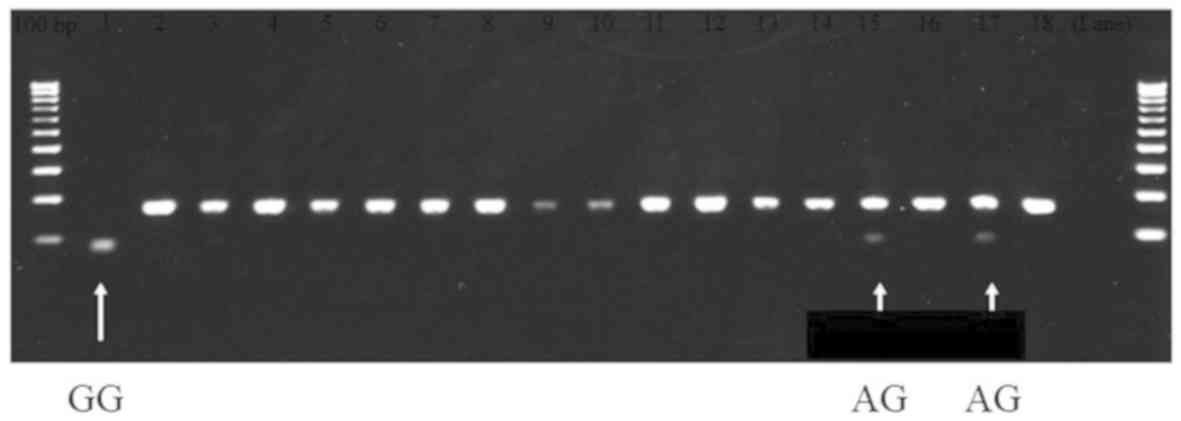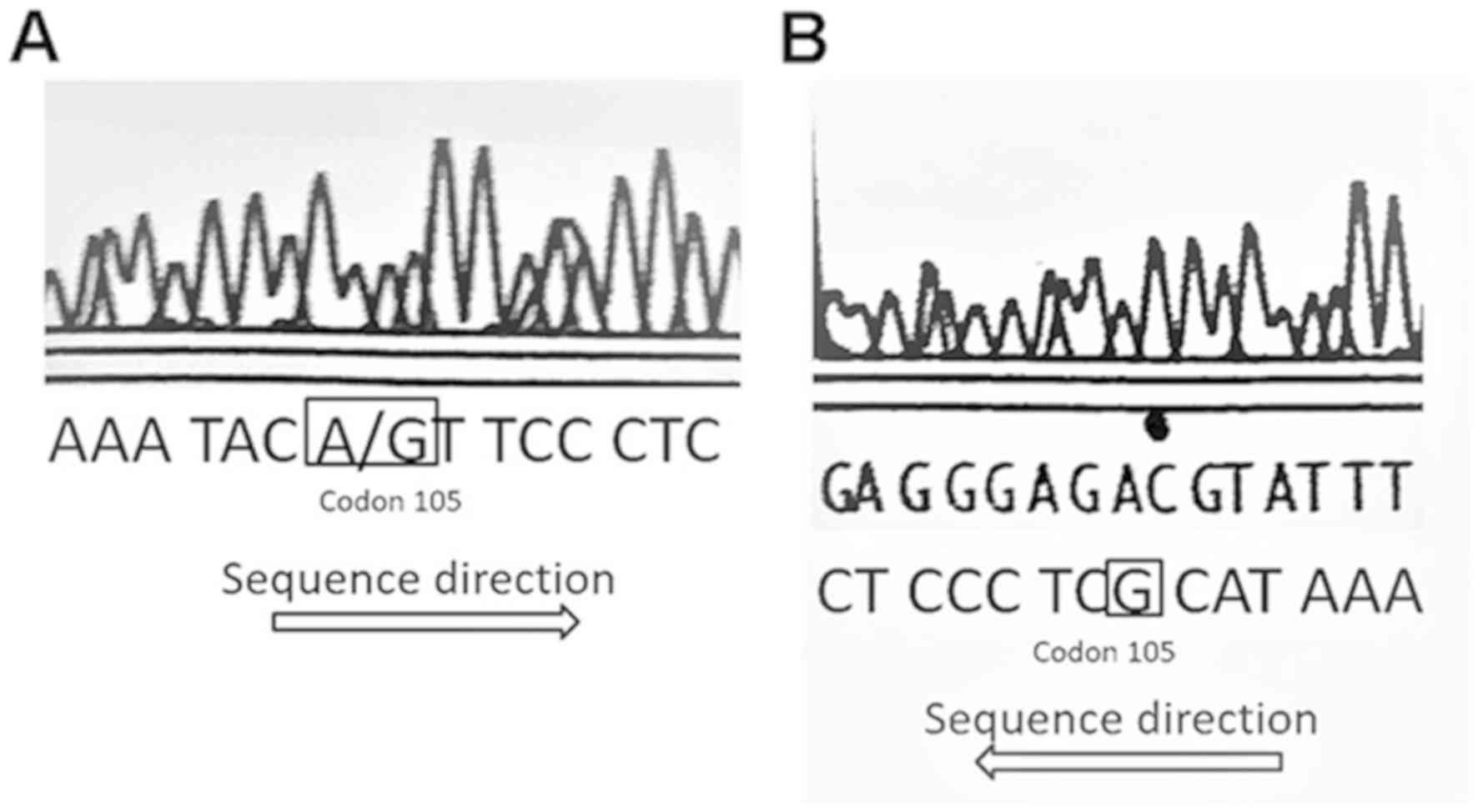|
1
|
Mitsuma A and Ando Y: Genetic backgrounds
of peripheral neuropathy induced by oxaliplatin. Nihon Yakurigaku
Zasshi. 141:62–65. 2013.(In Japanese). View Article : Google Scholar : PubMed/NCBI
|
|
2
|
Yamasaki K, Nagase M, Tamagawa H, Ueda S,
Tamura T, Murata K, Eguchi Nakajima T, Baba E, Tsuda M, Moriwaki T,
et al: Randomized phase III study of bevacizumab plus FOLFIRI and
bevacizumab plus mFOLFOX6 as first-line treatment for patients with
metastatic colorectal cancer (WJOG4407G). Ann Oncol. 27:1539–1546.
2016. View Article : Google Scholar : PubMed/NCBI
|
|
3
|
Lecomte T, Landi B, Beaune P, Laurent-Puig
P and Loriot MA: Glutathione S-transferase P1 polymorphism
(Ile105Val) predicts cumulative neuropathy in patients receiving
oxaliplatin-based chemotherapy. Clin Cancer Res. 12:3050–3056.
2006. View Article : Google Scholar : PubMed/NCBI
|
|
4
|
Stoehlmacher J, Park DJ, Zhang W, Groshen
S, Tsao-Wei DD, Yu MC and Lenz HJ: Association between glutathione
S-transferase P1, T1 and M1 genetic polymorphism and survival of
patients with metastatic colorectal cancer. J Natl Cancer Inst.
94:936–942. 2002. View Article : Google Scholar : PubMed/NCBI
|
|
5
|
Sumiyoshi Y, Hashine K, Kasahara K and
Karashima T: Glutathione chemoprotection therapy against
CDDP-induced neurotoxicity in patients with invasive bladder
cancer. Gan To Kagaku Ryoho. 23:1506–1508. 1996.(In Japanese).
PubMed/NCBI
|
|
6
|
De Gramont A, Vignoud J, Tournigand C,
Louvet C, André T, Varette C, Raymond E, Moreau S, Le Bail N and
Krulik M: Oxaliplatin with high-dose leucovorin and 5-fluorouracil
48-hour continuous infusion in pretreated metastatic colorectal
cancer. Eur J Cancer. 33:214–219. 1997. View Article : Google Scholar : PubMed/NCBI
|
|
7
|
Le Morvan V, Smith D, Laurand A, Brouste
V, Bellott R, Soubeyran I, Mathoulin-Pelissier S and Robert J:
Determination of ERCC2 Lys751Gln and GSTP1 Ile105Val gene
polymorphisms in colorectal cancer patients: Relationships with
treatment outcome. Pharmacogenomics. 8:1693–1703. 2007. View Article : Google Scholar : PubMed/NCBI
|
|
8
|
Meulendijks D, Rozeman EA, Cats A,
Shkorska K, Joerger M, Deenen MJ, Beijnen JH and Schellens JHM:
Pharmacogenetic variants associated with outcome in patients with
advanced gastric cancer treated with fluoropyrimidine and
platinum-based triplet combinations: A pooled analysis of three
prospective studies. Pharmacogenomics J. 17:441–451. 2017.
View Article : Google Scholar : PubMed/NCBI
|
|
9
|
de A, raújo RM, de Melo CF, Neto FM, da
Silva JN, Soares LF, de Arruda Cardoso Smith M, Sousa EC Jr,
Burbano RM, de Medeiros AC and Lima EM: Association study of SNPs
of genes IFNGR1 (rs137854905), GSTT1 (rs71748309), and GSTP1
(rs1695) in gastric cancer development in samples of patient in the
northern and northeastern Brazil. Tumour Biol. 35:4983–4986.
2014.PubMed/NCBI
|
|
10
|
Chen ZH, Xian JF and Luo LP: Association
between GSTM1, GSTT1, and GSTP1 polymorphisms and gastric cancer
risk, and their interactions with environmental factors. Genet Mol
Res. 16:2017. View Article : Google Scholar
|
|
11
|
Ma Y, Wei X, Han G, Xue M, Li G and Li Y:
Glutathione S-transferase P1 Ile105Val polymorphism contributes to
increased risk of gastric cancer in East Asians. Tumour Biol.
34:1737–1742. 2013. View Article : Google Scholar : PubMed/NCBI
|
|
12
|
Cancer T herapy Evaluation Program: Common
Toxicity Criteria (CTC) Version 2.0. https://ctep.cancer.gov/protocolDevelopment/electronic_applications/docs/ctcv2nom-4-30-99-final3.pdfApril
30–1999
|
|
13
|
Eisenhauer EA, Therasse P, Bogaerts J,
Schwartz LH, Sargent D, Ford R, Dancey J, Arbuck S, Gwyther S,
Mooney M, et al: New response evaluation criteria in solid tumours:
Revised RECIST guideline (version 1.1). Eur J Cancer. 45:228–247.
2009. View Article : Google Scholar : PubMed/NCBI
|
|
14
|
U.S. Department of Health and Human
Services, National Institutes of Health, National Cancer Institute:
Common terminology criteria for adverse events (CTCAE) Version 4.0.
https://evs.nci.nih.gov/ftp1/CTCAE/CTCAE_4.03/CTCAE_4.03_2010-06-14_QuickReference_5×7.pdfMay
28–2009
|
|
15
|
Harries LW, Stubbins MJ, Forman D, Howard
GC and Wolf CR: Identification of genetic polymorphisms at the
glutathione S-transferase Pi locus and association with
susceptibility to bladder, testicular and prostate cancer.
Carcinogenesis. 18:641–644. 1997. View Article : Google Scholar : PubMed/NCBI
|
|
16
|
Jiao L, Bondy ML, Hassan MM, Chang DZ,
Abbruzzese JL, Evans DB, Smolensky MH and Li D: Glutathione
S-transferase gene polymorphisms and risk and survival of
pancreatic cancer. Cancer. 109:840–848. 2007. View Article : Google Scholar : PubMed/NCBI
|
|
17
|
Cowell IG, Dixon KH, Pemble SE, Ketterer B
and Taylor JB: The structure of the human glutathione S-transferase
pi gene. Biochem J. 255:79–83. 1988. View Article : Google Scholar : PubMed/NCBI
|
|
18
|
Kano T, Sakai M and Muramatsu M: Structure
and expression of a human class pi glutathione S-transferase
messenger RNA. Cancer Res. 47:5626–5630. 1987.PubMed/NCBI
|
|
19
|
Lecomte T, Landi B, Beaune P, Laurent-Puig
P and Loriot M: Glutathione S-transferase P1 polymorphism
(Ile105Val) predicts cumulative neuropathy in patients receiving
oxaliplatin-based chemotherapy. Clin Cancer Res. 12:3050–3056.
2006. View Article : Google Scholar : PubMed/NCBI
|
|
20
|
Cheeseman SL, Joel SP, Chester JD, Wilson
G, Dent JT, Richards FJ and Seymour MT: A ‘modified de Gramont’
regimen of fluorouracil, alone and with oxaliplatin, for advanced
colorectal cancer. Br J Cancer. 87:393–399. 2002. View Article : Google Scholar : PubMed/NCBI
|
|
21
|
Koizumi W, Narahara H, Hara T, Takagane A,
Akiya T, Takagi M, Miyashita K, Nishizaki T, Kobayashi O, Takiyama
W, et al: S-1 plus cisplatin versus S-1 alone for first-line
treatment of advanced gastric cancer (SPIRITS trial): A phase III
trial. Lancet Oncol. 9:215–221. 2008. View Article : Google Scholar : PubMed/NCBI
|
|
22
|
Moscow JA, Fairchild CR, Madden MJ, Ransom
DT, Wieand HS, O'Brien EE, Poplack DG, Cossman J, Myers CE and
Cowan KH: Expression of anionic glutathione-S-transferase and
P-glycoprotein genes in human tissues and tumors. Cancer Res.
49:1422–1428. 1989.PubMed/NCBI
|
|
23
|
Oki E, Kakeji Y, Ohgaki K, Saeki K, Morita
M, Emi Y and Maehara Y: Impact of single nucleotide polymorphisms
in glutathione S transferase gene GSTP1 in the treatment with
oxaliplatin based chemotherapy. Gan To Kagaku Ryoho. 35:1094–l096.
2008.(In Japanese). PubMed/NCBI
|
|
24
|
Park SA, Choi KS, Bang JH, Huh K and Kim
SU: Cisplatin-induced apoptotic cell death in mouse hybrid neurons
is blocked by antioxidants through suppression of
cisplatin-mediated accumulation of p53 but not of Fas/Fas ligand. J
Neurochem. 75:946–953. 2000. View Article : Google Scholar : PubMed/NCBI
|
|
25
|
McLeod HL, Sargent DJ, Marsh S, Green EM,
King CR, Fuchs CS, Ramanathan RK, Williamson SK, Findlay BP,
Thibodeau SN, et al: Pharmacogenetic predictors of adverse events
and response to chemotherapy in metastatic colorectal cancer:
Results from North American gastrointestinal intergroup Trial
N9741. J Clin Oncol. 28:3227–3233. 2010. View Article : Google Scholar : PubMed/NCBI
|
|
26
|
Chen YC, Tzeng CH, Chen PM, Lin JK, Lin
TC, Chen WS, Liang JK, Wang HS and Wang WS: Influence of GSTP1
l105V polymorphism on cumulative neuropathy and outcome of FOLFOX-4
treatment in Asian patients with colorectal carcinoma. Cancer Sci.
101:530–535. 2010. View Article : Google Scholar : PubMed/NCBI
|
|
27
|
Inada M, Sato M, Morita S, Kitagawa K,
Kawada K, Mitsuma A, Sawaki M, Fujita K and Ando Y: Association
between oxaliplatin-induced peripheral neuropathy and polymorphisms
of the ERCC1 and GSTP1 genes. Int J Clin Pharmacol Ther.
48:729–734. 2010. View Article : Google Scholar : PubMed/NCBI
|
|
28
|
Tournigand C, Cervantes A, Figer A, Lledo
G, Flesch M, Buyse M, Mineur L, Carola E, Etienne PL, Rivera F, et
al: OPTIMOX1: A randomized study of FOLFOX4 or FOLFOX7 with
oxaliplatin in a stop-and-go fashion in advanced colorectal
cancer-a GERCOR study. J Clin Oncol. 24:394–400. 2006. View Article : Google Scholar : PubMed/NCBI
|
|
29
|
Cremolini C, Loupakis F, Antoniotti C,
Lupi C, Sensi E, Lonardi S, Mezi S, Tomasello G, Ronzoni M,
Zaniboni A, et al: FOLFOXIRI plus bevacizumab versus FOLFIRI plus
bevacizumab as first-line treatment of patients with metastatic
colorectal cancer: Updated overall survival and molecular subgroup
analyses of the open-label, phase 3 TRIBE study. Lancet Oncol.
16:1306–1315. 2015. View Article : Google Scholar : PubMed/NCBI
|
|
30
|
Lee KH, Chang HJ, Han SW, Oh DY, Im SA,
Bang YJ, Kim SY, Lee KW, Kim JH, Hong YS, et al: Pharmacogenetic
analysis of adjuvant FOLFOX for Korean patients with colon cancer.
Cancer Chemother Pharmacol. 71:843–851. 2013. View Article : Google Scholar : PubMed/NCBI
|
|
31
|
Stoehlmacher J, Park DJ, Zhang W, Yang D,
Groshen S, Zahedy S and Lenz HJ: A multivariate analysis of genomic
polymorphisms: Prediction of clinical outcome to 5-FU/oxaliplatin
combination chemotherapy in refractory colorectal cancer. Br J
Cancer. 91:344–354. 2004. View Article : Google Scholar : PubMed/NCBI
|
|
32
|
Kim SH, Kwon HC, Oh SY, Lee DM, Lee S, Lee
JH, Roh MS, Kim DC, Park KJ, Choi HJ and Kim HJ: Prognostic value
of ERCC1, thymidylate synthase, and glutathione S-transferase pi
for 5-FU/oxaliplatin chemotherapy in advanced colorectal cancer. Am
J Clin Oncol. 32:38–43. 2009. View Article : Google Scholar : PubMed/NCBI
|
|
33
|
Ongerboer de Visser BW and Tiessens G:
Polyneuropathy induced by cisplatin. Prog Exp Tumor Res.
29:190–196. 1985. View Article : Google Scholar : PubMed/NCBI
|
|
34
|
Liu YP, Ling Y, Qi QF, Zhang YP, Zhang CS,
Zhu CT, Wang MH and Pan YD: Genetic polymorphisms of ERCC1-118,
XRCC1-399 and GSTP1-105 are associated with the clinical outcome of
gastric cancer patients receiving oxaliplatin-based adjuvant
chemotherapy. Mol Med Rep. 7:1904–1911. 2013. View Article : Google Scholar : PubMed/NCBI
|
|
35
|
Ott K, Lordick F, Becker K, Ulm K, Siewert
J, Höfler H and Keller G: Glutathione-S-transferase P1, T1 and M1
genetic polymorphisms in neoadjuvant-treated locally advanced
gastric cancer: GSTM1-present genotype is associated with better
prognosis in completely resected patients. Int J Colorectal Dis.
23:773–782. 2008. View Article : Google Scholar : PubMed/NCBI
|
|
36
|
Kwon HC, Roh MS, Oh SY, Kim SH, Kim MC,
Kim JS and Kim HJ: Prognostic value of expression of ERCC1,
thymidylate synthase, and glutathione S-transferase P1 for
5-fluorouracil/oxaliplatin chemotherapy in advanced gastric cancer.
Ann Oncol. 18:504–509. 2017. View Article : Google Scholar
|
|
37
|
Geng R, Chen Z, Zhao X, Qiu L, Liu X, Liu
R, Guo W, He G, Li J and Zhu X: Oxidative stress-related genetic
polymorphisms are associated with the prognosis of metastatic
gastric cancer patients treated with epirubicin, oxaliplatin and
5-fluorouracil combination chemotherapy. PLoS One. 9:e1160272014.
View Article : Google Scholar : PubMed/NCBI
|
|
38
|
Watson MA, Stewart RK, Smith GB, Massey TE
and Bell DA: Human glutathione S-transferase P1 polymorphisms:
Relationship to lung tissue enzyme activity and population
frequency distribution. Carcinogenesis. 19:275–280. 1998.
View Article : Google Scholar : PubMed/NCBI
|
|
39
|
Union for International Cancer Control:
TNM Classification of Malignant Tumors. 8th. Brierley JD,
Gospodarowicz MK and Wittekind C: Wiley-Blackwell; Chichester:
2017
|
















